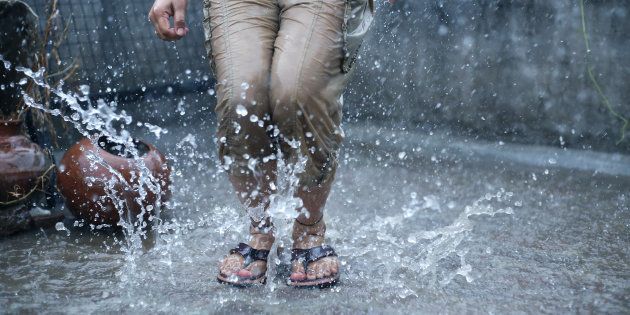We can see 50%-50% of people loving monsoon and hating it. I personally love and hate monsoon. I love how the rain produces its sound; it is so pleasant and calm feeling for me to hear. I love the first smell of the soil as soon as it rains. I love how the positive vibes come in my mind. Every rain takes me to my school days. It used to be so fun playing with each drop without caring for the health and scolds of parents.
Sitting in a cozy sofa in a low light room with popcorn and a good movie is something that visualized in my mind whenever it rains. But it’s only in my mind. Whenever it rains, I feel so lazy to do anything and just lay under the blanket and listen to melo music.
The reasons I hate monsoon is that I get wet pretty soon even after walking under an umbrella, roads get muddy, risk of natural calamities and disasters, mosquitoes are high in number, high chances of slipping in the floor, chances of getting cold and flues and so on.
My friend Jaya loves monsoon and she says “There are many reasons why one can hate monsoon but for me I love it. One is because I love getting wet in the rain, playing on the drizzling water is what I love. The little chills that we get from the weather are exhilarating and I love the smell of the soil which we can get during the first shower”.
The Do’s in Monsoon:
1. Always carry an umbrella or a raincoat with you wherever you go out. Because you never know when the rain will start. Also carry a plastic bag to put your umbrella and raincoat in it after use. Protect your electrical appliances like mobile, camera, laptops in the zip lock bag in order to prevent them from rain.
2. Wear light floral clothes or dark clothes because even if you get wet your inners won’t be visible and you won’t feel uncomfortable.
3. Drive safe and slow because during monsoon, rain makes the road slippery and your vehicles may slip and cause an accident. Switch on the headlights of your vehicles to make the way visible and aware other vehicles and people crossing the roads to see your vehicle and prevent accidents.
4. Wear light and open sandals or slippers. It will dry soon even if it gets wet.
5. Eat hygienic foods and filtered water. Make your body warm by drinking hot water or a tea or a coffee or any hot beverages.
6. Wash your hands and legs as soon as you get home. To prevent bacterial infections and to wash off the mud and dirt that are on your visible areas.
7. Carry a small towel and if possible carry extra clothes with you. So that if you get totally wet you can change it.
8. Try to walk away from grassy areas because you might slip or may fall down. And there is a high risk of snakes and leeches in this seasons near grassy areas.
9. During monsoon, it takes time to reach the destination. So, move a little fast then your scheduled time because you never know when the rain will start pouring you really hard.
10. Stay away from the river banks because there is high probability of flood and landslides (mainly while driving).
The Dont’s in Monsoon:
1. Don’t wear transparent clothes because as soon as you get wet, your inner dress will be visible and make you feel uncomfortable.
2. Don’t wear heels or heavy shoes because once you get stuck in the mud it will be difficult to take them out. Also, shoes get wet in rain and make it heavy which will be difficult to walk.
3. Don’t wear heavy clothing. It will take more time to dry off.
4. Don’t get wet in the rain because cold catches you easily in this season. There are high chances of viral cold and flu during this season.
5. Don’t walk and drive by the edge of roads because there are many chances of potholes and road is slippery.
6. Don’t directly drink tap water. If you have to drink it, first boil and filter the water. The sources of water mainly the river get easily contaminated due to natural calamities. The trees leave decay and animals may die, then their residue gets mixed in the river water which is our source of water (i.e. tap water).
7. Don’t stand near electrical poles, swimming pools because lightening can hit 60 miles away from nearest rainfall. Since electrical poles and swimming pools are the good conductors of electricity, it is safe to stay away from them.
8. Don’t eat street foods and drinks because they may get easily contaminated with the surrounding environment.
9. Don’t go hiking or plan visits to forest areas because there is a high possibility of natural calamities.
10. Don’t run or jump in the pedestrian bridges, slope areas, muddy roads or any possible places that are slippery because you may slip and get injuries.
So, are you ready to tackle with the rain this “MONSOON” ?
Article By: Nisha Joshi



